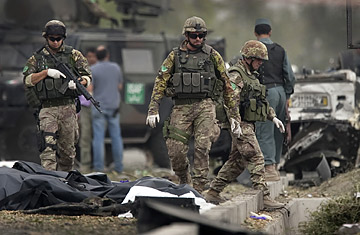
Italian soldiers stand by the body of a comrade killed after a suicide bomber hit an Italian ISAF convoy, killing six soldiers
There was barely time to mourn the dead. Less than 12 hours after a suicide attack in Kabul killed six Italian paratroopers, clear signs were already emerging in Italy that the country may no longer be willing to commit to the long haul in Afghanistan.
Prime Minister Silvio Berlusconi told reporters late Thursday, Sept. 17, "We must bring our boys home [from Afghanistan] as soon as possible." Speaking at a European Union summit in Brussels, he cautioned that there was no fixed timetable for the pullout of the 3,100-strong contingent and that any withdrawal must be worked out with the other NATO allies present in Afghanistan.
Still, Berlusconi's almost instant reference to a possible troop pullout was the centerpiece of a day of impassioned, often contradictory reactions from the highest levels of the Italian government. It followed the nation's worst day of military casualties since a November 2003 car-bomb attack in Nasiriyah, in southern Iraq, killed 19 Italian soldiers. That death toll was cited when Italy eventually pulled out of Iraq in 2006, but at the time of the Nasiriyah attack, Berlusconi held firm to Italy's military commitment and ironclad alliance with then U.S. President George W. Bush.
This time, the immediate message was much more ambiguous, coming as Berlusconi continues to reel from a months-long sex scandal that has shaken his bearings and loosened what should otherwise be a tight hold over Parliament and his center-right coalition. As the first reports of the Thursday-morning bombing — which also killed 10 Afghan civilians — at an outdoor market in Kabul came in, the Ministers of Defense and Foreign Affairs both forcefully declared Italy's resolve to maintain its military presence in Afghanistan in the face of what Defense Minister Ignazio La Russa called a "cowardly" and "devious" attack.
But by the afternoon, a key ally of Berlusconi's, Northern League chief Umberto Bossi, was declaring that "the mission in Afghanistan has reached its end" and calling for Italy's troops to be brought home by Christmas. Foreign Minister Franco Frattini, a die-hard Berlusconi loyalist, said Friday there are no immediate plans for a pullout but expressed serious doubts about the situation in Afghanistan. "Much has to change," Frattini told the daily Corriere della Sera. "There needs to be ... more attention on the people who suffer and on reconstruction. The general vision of the mission must be changed." Frattini wants more emphasis on the approach Italian forces have used to stabilize more secure areas of Afghanistan, working with local leaders to guarantee security and improve services. Still, Italian troops — technically on a peacekeeping mission — are ever more aware that they are effectively fighting a war.
Sergio Romano, a Corriere columnist and former Italian ambassador to NATO, says Frattini's concerns echo those expressed in the halls of power across continental Europe. "He's saying what almost all European leaders are saying, either privately or publicly," Romano tells TIME. "There is a rather widespread idea that [the mission in Afghanistan] is not leading anywhere."
As American casualties soared to record numbers over the summer, European troop deaths have been creeping upward, provoking hard questions about the exact nature and objectives of the mission from London to Berlin. "The public doesn't really understand what we are doing there," says Romano.
In Italy and elsewhere, that leaves space for populists like Bossi to harvest new supporters by leading the charge for a fast pullout. These days Berlusconi is more vulnerable to recalcitrant allies in the face of near daily blowback from a private-life scandal that began in April when his estranged wife accused him of "frequenting underage females."
Still, columnist Romano believes that Berlusconi's nod to public doubts about Italy's role in Afghanistan is outweighed by the reality that the Prime Minister must ultimately stick with Washington. Other European leaders face the same dilemma, especially now that U.S. President Barack Obama has arrived with a new approach to diplomacy that largely jibes with Europe's. "In the end, all you can really do is keep your soldiers there and accompany them until the day that Obama sees it is O.K. for a pullback," says Romano. "It's a very passive diplomacy, but it's not irrational. You can't really undermine American foreign policy, especially now."
But the latest attack against Italian troops and the bring-home-the-boys reaction show how quickly the dominoes of the alliance could begin to fall. And like the situation on the ground in Afghanistan, the next turn in Italian politics is virtually impossible to predict.
